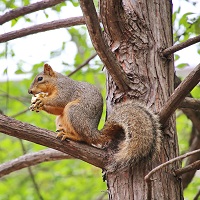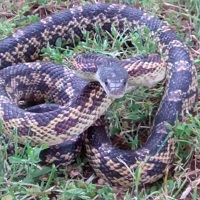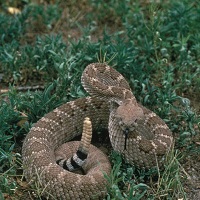Raccoons

While they might look cute and cuddly, these creatures are often some of the most aggressive wildlife that are seen by Animal Control Officers. They are also a high risk category for rabies. If you seen one walking or stumbling around in the daytime, DO NOT APPROACH IT.
Opossums

Seen throughout most of central Texas, opossums look like big rats. Usually grey, black and white in color, they hang by their tails, and are typically not very aggressive. However, as a wild animal, they should be treated with respect and given plenty of leeway when it comes to approaching them.
Armadillos

The nine banded armadillo is often found in Texas. Having a leathery shell and sharp claws, they most often wreak havoc on private lawns and flower beds digging for food. They often burrow underground to sleep.
They are also known to jump when startled, which means many of them end up being killed by traffic. They do carry a host of diseases, among them being leprosy. If you see an armadillo, do not touch and maintain your distance.
Fox Squirrel

The Fox Squirrel is most often seen in Waco. While they look innocent enough, they can spell disaster if allowed in the attic of a house. They can easily chew through wiring, causing house fires, and can keep residents up at night with their constant scurrying back and forth. They also can cause financial damage to those who sell pecans.
Animal Control does not assist with squirrels - if relocated, they will not survive.
Rat Snake

The Rat Snake is most often mistaken for the Rattlesnake, because of it’s closeness in color and also because they vibrate their tail when they’re threatened or alarmed, making it sound like they have a rattle.
Unlike its look-alike however, this snake is non venomous, although it can be extremely aggressive when encountered in the wild. If you have one of these in your home, contact Animal Control.
Diamond Back Rattlesnake

The diamond back rattlesnake is easily identified by its rattle. As one of only a few species of venomous snakes in Texas, there have been some found in Waco.
Extremely aggressive and highly dangerous, if you see one of these creatures in your home, maintain a safe distance and contact Animal Control immediately.
Top 10 ways to help prevent wildlife problems at your home:
- Don’t leave cat or dog food outside overnight.
- Don’t leave bird seed in feeders or on the ground overnight.
- Don’t put unsecured garbage outside at night.
- If you have a pet door, securely close it at night.
- Trim overhanging branches that provide easy access to your roof for squirrels and other wildlife.
- Secure your chimney with a cap. This will help to keep out birds and raccoons.
- Inspect your roof, eaves and siding for damage. Cover attic vents and other roof openings with heavy-gauge, rustproof wire mesh.
- Cover foundation vents with heavy-gauge, rustproof wire mesh.
- If you have a deck, install an L-shaped barrier to prevent animals from digging underneath it.
- Share this information with a neighbor.
If you encounter a wild animal in your home such as a raccoon, opossum, bird or squirrel remain calm. The animal should be directed toward an open door or window without a screen. If the animal is in the attic, fireplace or under the house you should contact a wildlife removal company.
Animal Control provides service for wildlife that has been securely caught in a live trap. The City of Waco does not provide these types of traps to citizens. These traps can be purchased at your local hardware or feed stores. Raccoons and opossums may be picked up and relocated within a 10 mile radius from the location they were caught. Skunks that have been caught in traps may be picked up provided they are securely covered on all sides including the bottom. The only part of the trap that should not be securely covered is the opening where the skunk entered.
If you need assistance with an animal issue either wild or domestic please contact Animal Control at (254) 750-1765.
Trapping Requirements
When trapping an animal in the City of Waco, please keep the animal’s safety and welfare in mind. Use appropriate size traps when trapping. Traps range from small to large.
Traps should not be set on weekends or during extreme weather conditions (i.e. temperatures over 100°F, below 20°F or when hailing, snowing, etc).
Helpful list of bait
Armadillo Meal worms, other worms, or insects enclosed in a little cloth bag, maggots, sardines, fish.
Cat Fish, meats, oil of catnip, sardines. Poke holes in sardine can top, dribble juice up to trap, put can behind trigger.
Dogs Old meat, dog food.
Opossum Vegetables, sweet apples, chicken entrails, sardines, crisp bacon, canned cat food, almost anything edible will work.
Rabbit Fresh vegetables, such as brussel sprouts, cabbage, carrots, lettuce, or apples. In winter time, bread can be good bait. Spraying the inside of the trap with apple cider has also proved effective.
Raccoon Anything of a fishy nature: Sardines, raw fish, etc. Smoked meat, sweet corn or fruit, molasses, peanut butter or honey, peanut butter on raison bread, crisp bacon, marshmallows, strawberry licorice, persimmons, and fruit filled breakfast bars.
Skunk Almost anything edible, chicken entrails, fish, fresh or canned, insect larvae, crisp bacon, eggs.
Note: When trapping skunks Animal Control may service the trap if the trap is securely covered on all sides including the bottom. The only part of the trap that should not be covered is the opening where the skunk went in. If the trap is not covered properly you will be referred to a wildlife management service.